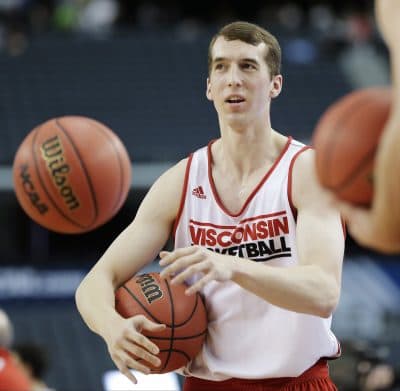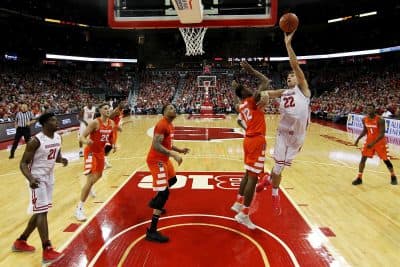At the heart of this week special episode about the NCAA is a simple question: Should college athletes be paid?
And I’m going to go out on a limb and guess that when many of our listeners hear this question, their knee-jerk reaction is, “No.”
And actually, I’m not taking any chances, because studies show that the majority of Americans don’t think college athletes should be paid. A 2014 poll by the Washington Post and ABC News found that approximately two in three Americans oppose paying college athletes.
And when basketball player Zach Bohannon transferred to the University of Wisconsin in 2011, he was like most Americans.
“I don’t think students should be paid. It just seems stupid,” Zach recalls.
That year, Zach took a debate class.
“Communications 262,” Zach said.
And for the final project, everyone had to debate a topic with a partner. Zach decided to oppose paying college athletes.
He made many of the typical arguments: Athletes are already well compensated on scholarship, athletic departments shouldn’t get bigger, and college sports teach invaluable lessons.
But then something happened that Zach didn’t expect.
“The more research I did, the less sense it made,” he says.
“It’s astonishing”
Zach was an economics major, and as he studied the NCAA’s business model, he became suspicious.
Zach realized that by agreeing to limit compensation to an athletic scholarship, colleges were essentially colluding to keep labor costs artificially low, which meant more money was being paid to coaches and athletic departments.

“These incomes are so lopsided,” Zach says. “The compliance director, who literally just enforces NCAA rules, makes six figures from this unpaid work. It’s mind-boggling.”
Zach began to notice other ways that players seemed to be getting screwed. He and his teammates had to wear Adidas sneakers. For what? Not because they liked Adidas. But because the company paid Wisconsin spends hundreds of thousands of dollars a year turning its athletes into walking advertisements.
“They literally label us,” Bohannon says. “And I thought, ‘We don’t see a dime from these sponsorship deals.'”
(This kind of deal, by the way, is acceptable to the FBI and the NCAA.)
As you can probably tell, Zach has become passionate about this issue. He joined a group called the National College Players Association and became an NCAA expert.
But several factors prevented Zach Bohannon from becoming the face of the opposition. For one thing, he was going to graduate soon. Second, he wasn’t exactly a household name in college basketball.
Better a young, emerging star.
And that’s when Zach met Nigel Hayes.
An unexpected ally
Nigel Hayes enrolled at Wisconsin in 2013. It was Zach Bohannon’s final season with the Badgers, and he was hoping to get more playing time.
But Nigel Hayes was a blue-chip recruit who played forward, just like Zach.
They didn’t get along.
“Yeah, I wasn’t a fan of Zach Bohannon,” Nigel says.
“Nigel came in as a cocky, wide-eyed freshman,” Zach says.
And from the first scrimmages, Zach could tell that Nigel was the better player.
“I remember sitting on the sidelines, I was like, ‘This is not how my senior year is supposed to go. I’m supposed to play,’” Zach recalls.
“So you could kind of see your playing time ticking away?” I ask
“Yeah, at that point I did, which was pretty unfortunate to see.”
As the season progressed, Zach focused more on informing his teammates about the problems he was seeing with the NCAA.
And he found an unexpected ally.
“He was very intrigued by my opinions and he kept asking me, ‘Well, what about this?’ Or ‘So what?'” Zach says of Nigel. “And before it was all said and done, he knew these subjects as well as I did. And I was like, ‘He’s perfect. He’s the right person for this cause.'”
The most vocal critic in uniform
About three years later, with ESPN in Madison on the morning of a Wisconsin-Ohio State football game for its popular “College GameDay” show, Nigel Hayes positioned himself in the crowd of cheering students.
It was holding a sign which read: “Broken college athlete. Anything can help. » The image went viral.
Nigel was the real deal on the basketball court – he made first team All-Big Ten as a junior – and he had also become the NCAA’s most vocal critic while still in uniform.
“We are not “student-athletes”. We came there to play sports. I never saw a single teacher, I never had a school counselor come to my house, attend any of my high school games. So if I’m here for school, why weren’t these people recruiting for me to come there?
Nigel Hayes
He wasn’t afraid to say it wasn’t fair that he couldn’t afford a plane ticket home for Thanksgiving while playing for a team that I won millions for Wisconsin.
He was not afraid to say that the majority of elite basketball and football players were black while “their coaches are all white and are paid millions.”
And he wasn’t afraid to say things like, “We’re not ‘student-athletes.’ We came there to play sports. I never saw a single teacher, I never had a school counselor come to my house, attend any of my high school games. So if I’m here for school, why aren’t these people recruiting?
But unbeknownst to almost anyone who saw Nigel’s poster that October morning or read his tweets criticizing the NCAA’s business model, Nigel Hayes was hatching a much more ambitious plan to disrupt the NCAA: a boycott.
“Our dream and the NCAA’s nightmare”
Zach Bohannon and Nigel Hayes certainly aren’t the only college athletes who have tried to fight the NCAA.
There were lawsuits. A recent high-profile class action v. NCAA lawsuit filed by former UCLA basketball star Ed O’Bannon claimed that college athletes should be allowed to profit off their own name and likeness.
The courts have largely agreed with O’Bannon’s arguments, but did not force the NCAA to make major changes.
And then some of our listeners probably remember that the Northwestern football team I tried to join a union few years ago.
But the National Labor Relations Board essentially rejected the team’s request.
But there is one idea that many people think could change the situation: a boycott.
“Oh, my God, this is our dream and the NCAA’s nightmare,” wrote the Washington Post. Kevin Blackstone said. “I can’t imagine what the reaction would be.”
Nigel Hayes knew what a boycott could do.
“I think that’s really all it would take,” he said.
And last year, Nigel decided he was going to try to lead the Wisconsin men’s basketball team in a boycott.
“Someone has to step up to make change,” he says.
Nigel looked through the team schedule. Refusing to play would mean forfeiting, so he wanted to find a game that would draw attention but wouldn’t hurt his team’s chances of winning the Big Ten Conference.
One game stood out: On November 29, Wisconsin would host nationally ranked Syracuse.
“We were also on ESPN that night,” Nigel says.
Nigel sent a message to his teammates.
“’If I wanted to do this, sit down and not play, would you be okay with it?’” he recalls.
A teammate responded. It was a yes. Then another message arrived. Another yes.

“I think four people said yes in our group chat,” says Nigel. “And then one of them was like, ‘No.’ So it was like, okay, forget it. If everyone doesn’t agree, we’re not going to do it .”
“Looking back now, what do you think about that? I ask.
“I feel good,” he said. “It’s the decision the team wanted, so it’s all good. I was still able to plant a seed. So, it’s not because I didn’t do it, like Tupac said , that you don’t inspire the person who will change the world.”
A new trial
Nigel graduated from Wisconsin in May and signed with the New York Knicks. But he could still play a direct role in changing the NCAA.
A few years ago, Zach Bohannon was asked to sign a new class-action lawsuit against the NCAA. Zach did some research and realized that this trial was even bigger in scope than the previous ones. It was led by an antitrust lawyer Jeffrey Kessler – the guy who helped bring free agency to the NFL – and his goal was to adopt the entire amateur model so athletes could get paid.
But after being invited, Zach said, I can think of someone even better than me.
“So I contacted Nigel the next day about the trial,” says Zach. “And literally, it was probably a 10 or 15 second conversation. He said to me, ‘Zach, do you think this is something I should do?’ And I said, ‘Absolutely.’ And he goes, ‘More importantly, do you think this is in the best interest of all student-athletes across the country? I’m like, ‘It’s a Obviously, Nigel.” He said, ‘I’m in.'”
Nigel Hayes was deposed in March 2015. The case is expected to go to trial next year.
What about Nigel and Zach?
“We are very good friends,” says Nigel. “You know, using the phrase ‘iron sharpens iron,’ we simply see something in each other that we can both help and try to improve.”
This story is part of Only a gameThe special episode on the past, present and future of the NCAA. Watch the full episode here.
